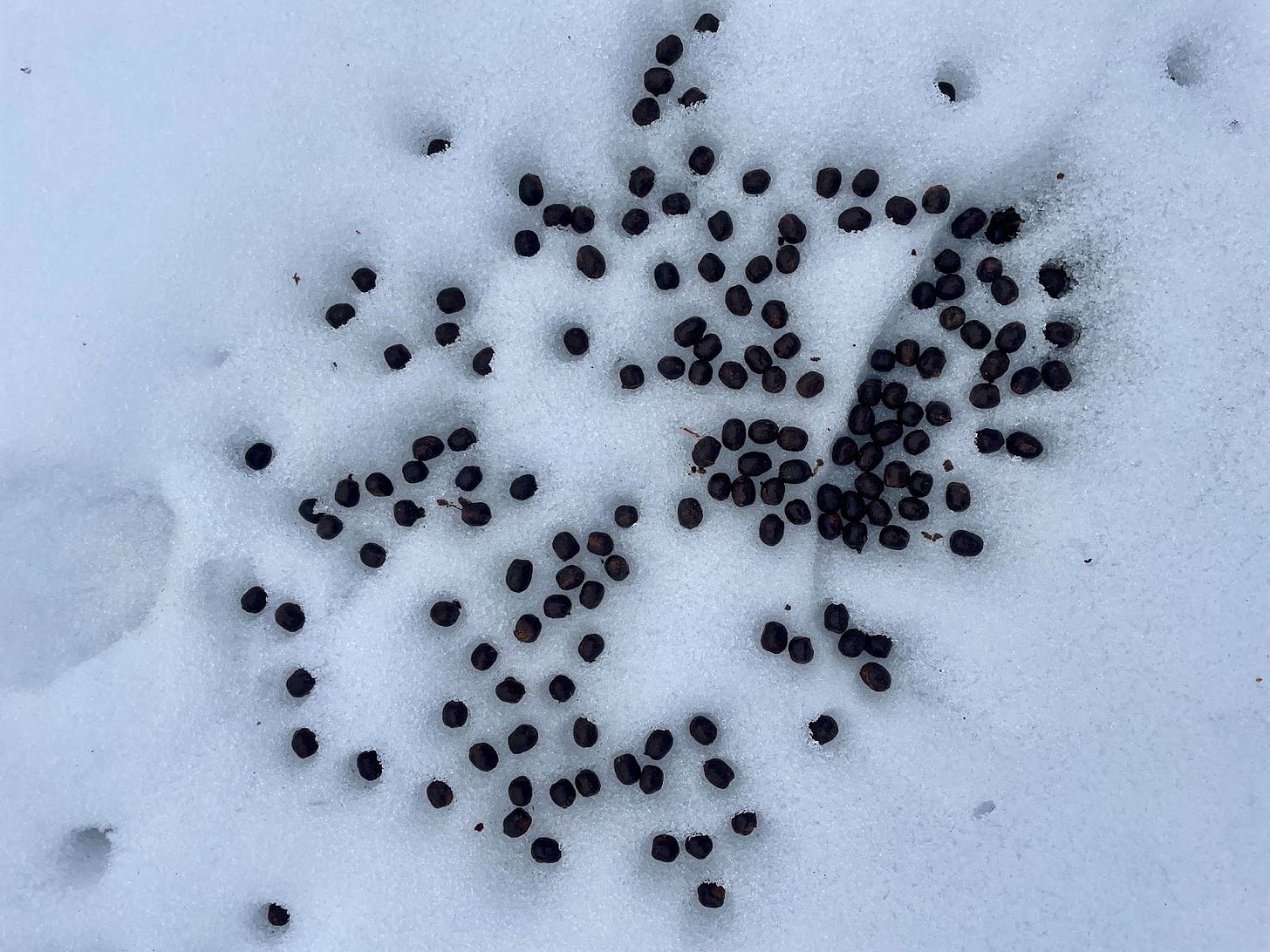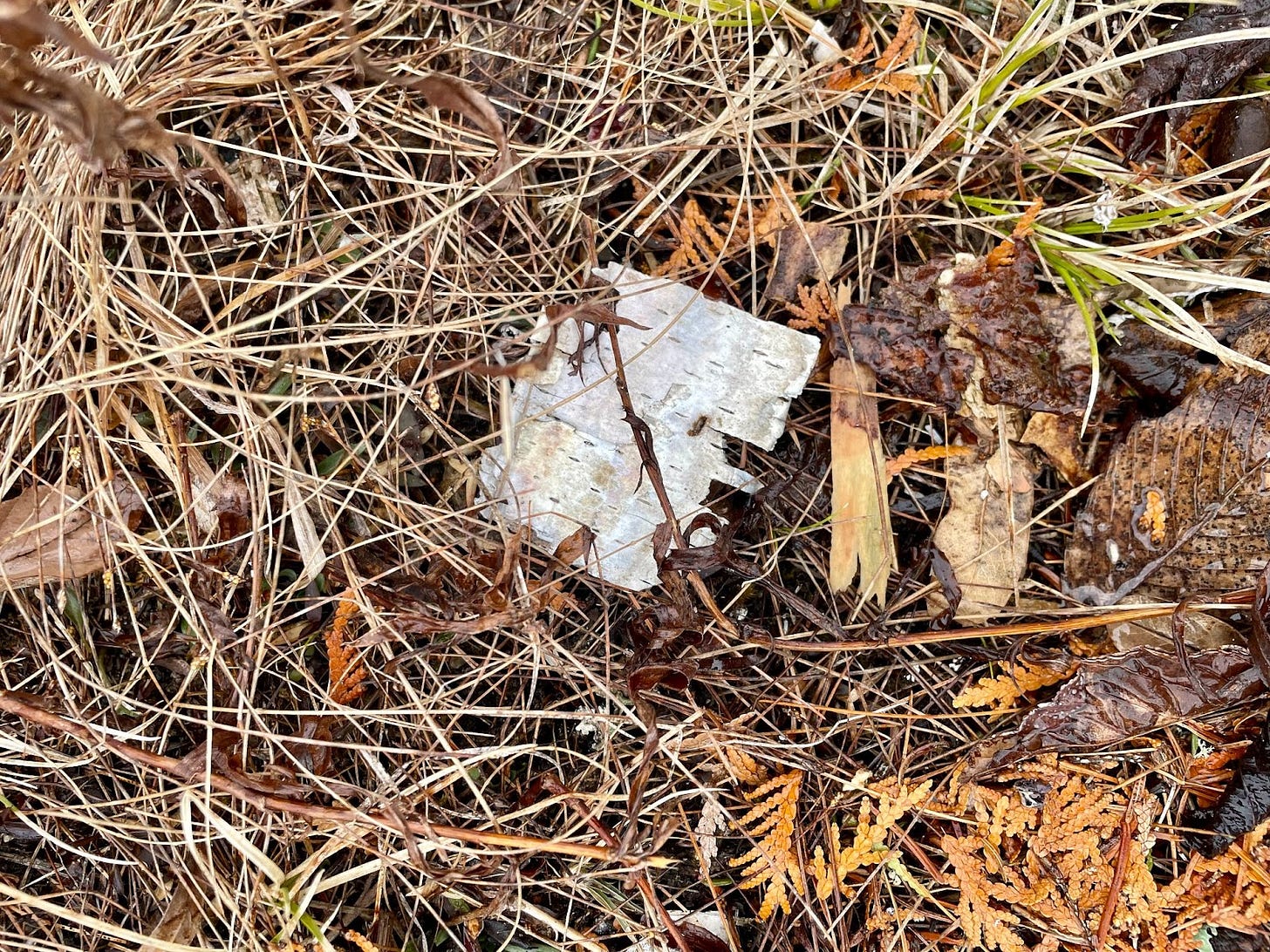Note: you can listen to the 38 minute podcast version of this posting here (it includes excerpts from my 1998 soundscape composition Au dernier vivant les biens).
BTW: I’ve changed the purpose of this ‘a calm presence’ newsletter from
short, practical essays for those frightened by the ecological crisis and searching to heal our relations
to
short, practical essays about collapse acceptance, adaptation, response and art
It might change again, and again, because, as Octavia Butler says : ‘life is change’.
deep adaptation hits a chord
I first came across Jem Bendell’s work in Michael Shaw’s 2019 film Living in the Time of Dying, which led me to write my terrified essay in 2019 which, in turn, kick started my learning/unlearning journey with the conscient podcast - balado conscient, which is now entering year 5, to which I added this newsletter in February, 2024.
I do not agree with everything Dr. Bendell says, but I appreciate his courageous work and the underlying premise of the deep adaptation forum or DAF (which he founded). I agree with the values of universal compassion, curiosity and respect and the 4Rs : resilience, relinquishment, restoration and reconciliation.
This framework resonates, deeply, with me, which is why I modified purpose of ‘a calm presence’ newsletter.
Also resonant was my viewing of Bendell’s There are Benefits from Accepting Collapse: a DA Conversation with Karen Perry about Perry’s 15 Benefits of Collapse Acceptance: freedom, urgency, parameters, presence, gratitude, calm grounding, community localism, super hero release, universalism, empathy, privilege perspective, amends, death comfort, letting go and enjoyment.
It’s worth 2 hours of your life. I plan to come back to these benefits in future postings.
My engagement with the deep adaptation forum reminded me of these two excerpts from my initial a calm presence posting on February 16, 2024 called why? : my rationale for creating 'a calm presence' newsletter:
I feel more alive when facing reality than living in denial.
and
I do this work with a ‘reality lens’, which to me means seeing/hearing/feeling life as it really is (e.g. a finite living planet) as opposed to what we have been conditioned and brainwashed to believe through a “modern lens” (e.g. endless extractive growth).
(screen grab from https://www.deepadaptation.info/)
collapse acceptance
I now accept collapse, in the spirit of the DAF, which is dedicated to:
embodying and enabling loving responses to our predicament
The DAF describes our ‘predicament’ as :
societal collapse arising from our climate emergency, global economic and environmental crises, species extinction, soil degradation, extreme weather events, forced migration, historical and systemic planet and people abuse, and much more
On the DAF website, the term societal collapse or breakdown is used to describe :
the ending of our modern ways of sustaining human life. Different people within DAF view this as likely, inevitable or already happening. Societal collapse includes limited or nonexistent access to food, shelter, safety, pleasure, identity, and meaning, as well the failure of our institutions and social structures.’
As a result of my collapse acceptance, I no longer believe in the narratives of modernity (though I remain complicit with them).
I think of those stories as fairy tales, as Greta Thunberg once said.
But I've not become a doomist or a defeatist.
Rather, I now hear and feel life through the lens of collapse acceptance, adaptation and responsiveness.
In other words, I’m no longer trying to save this world, nor do I worry about it (see Preparing for the end of the world as we know it).
My goal now is to ‘embody and enable loving responses to our complex predicaments’, with a calm presence, daily qi gong, my sound art practice and we’ll see where this takes me.
(creative exercise I did during Facing Human Wrongs course, summer 2022)
learning and unlearning
I’ve had the privilege of participating in a number of courses, networks and workshops in the last 5 years (many of which are ongoing initiatives), including:
2020 Creative Climate Leadership (also see conscient podcast e18)
2022 Creative Decolonization
2024 alchemize
My ‘to do’ wish list include the Post Carbon Institute’s Think Resilience, the Good Grief Network’s 10 Step Program, the University of the Forest, the Department. of Utopian Arts and Letters and Quillwood Academy. New ones emerge every day. I’ll continue writing about my learnings on this platform and through conscient.
Note: most of these courses are in English. Si vous en connaissez en français svp me le laisser savoir : claude@conscient.ca.
I also draw knowledge from essays and articles, such as this quote from Sahana Chattopadhyay’s Demystifying the ‘Pluriverse’ as the Hegemony Unravels:
In the compost of this collapse lies the fertile seeds and imaginaries of possible futures that are counter-hegemonic, beyond anthropocentric, and beyond growth. These seeds are the imaginal cells of pluriversally constituted futures, and need to be carefully nurtured, nourished, and stewarded. The world is yearning for such vision holders and wayfinders who can sense and actualize emerging futures.
Chattopadhyay’s words remind me of wise advice I received from sound artist and educator Azul Carolina Duque in 2023 as part of my Sounding Modernity project:
The role of art is more about the relationship between consolation and hope.
Consoled hope?
Hopeful consolation?
What about art?
(photo of deer droppings, duhamel, québec)
7 conscient podcast quotes
Here are 7 excerpts from recent episodes that lift my spirit and raise questions that I am exploring;
e163 transition innovation group - art and defeatism
I’m wanting something from art, which I think is much deeper, is a re-imagination of what it means to be human. I feel like we've instrumentalized and trivialized art and actually lost its capacity to expand our thesis of how we imagine ourselves and the world around us. I asked that question because the economy that we've created around art may have actually distorted its capacity to disturb us and to challenge our imagination of selves, which I think is probably at the root of the crisis that we face, a much deeper structural challenge of pretty much how we imagine ourselves and how we imagine our relationship with the world and every route. (Indy Johar)
How can we de-instrumentalize and de-trivialize art?
What are some of the barriers to this re-imagining?
e164 jimmy ung - proximity proportionate responsibility
If we were to do an inventory of where all the things we own were made, that would give us a very interesting map of where our responsibility, our attention and our donations ought to go because our pressures on the global systems can be revealed. That's a much more reasonable way to interact with different crises than to simply read about it on the news and interact with the whole of it without the context .
How can we become more aware of the context of our footprint?
How do we know which context is real in a world that is increasingly artificial?
BTW I created a poem from Jimmy’s quote in my bicycle repair posting :
May I have the wisdom to read the map of where my responsibilities, attention and donations ought to go
May I notice when the pressures of my behavior on global systems are revealed
May I interact with whole experiences, informed by the context of my footprint
e165 bill crandall - art can change us
Being an artist who is making art in the context of climate is more about being a kind of light in the darkness and making us believe in ourselves and in the future so that we want to endeavor to save the thing that we have, like our habitat. Some people like to say art can't change the world, but art can change us and then we can change the world more effectively.
Be it a light in the darkness, or a canary in a coal mine, how can the arts help us change the seemingly impossible?
Which part of ourselves should we believe in?
e166 david maggs - the art of being
My argument is that we are intuiting the ability of art to work at the level of being, able to engage with transformative change, but what happens is we live in a culture that is so structured around problem solving at the level of information and knowledge that as soon as we think, of course art has something really important to do with this, then, immediately, instead of allowing the arts to pull climate discourse into the realm of being, climate discourse pulls art into the realm of knowing.
How can art help us shift from the realm of knowing to being?
What will we transform into?
e167 barbara cuerden - tending the garden of art
The garden doesn't have to be something that's instrumental. It can be just a place where you sit, where you're thinking of growing something, you know, where the sun shines and where photosynthesis takes place and everything is sort of manifested through the sunlight and the water. It's a fantastic thing on its own without actually having to produce a lot of stuff.
Note: Try replacing ‘the garden’ with ‘art’.
How can art help us reconnect with nature and ourselves?
How can we have more art with less stuff?
e168 felicia young - together through art
Community arts became my initial quest in the 1980’s as a reaction against the commercial art world. How can art participate in a functional way to connect not just art educated people, but our overall communities on issues affecting them that have meaning and purpose. Can we just speak about these issues or can we actually have it be transformative in some way to actually lead to some kind of social or policy change within the community by bringing people together and getting them working together.
How can community-engaged arts help us adapt to our predicament and focus on cultural rather than material well being?
How will we remember community art practices in the future?
e169 louise adongo - we’re all artists
How can we remind ourselves that we're all creative and we're all artists? I think that we need all parts of ourselves to be able to navigate this transition that we're in as a species and as a part of the world.
How do we remove barriers for all of us to become artists?
How can art help us become whole?
What then is my new chapter?
(grass and leaves by the preston river, duhamel, québec)
accept | adapt | respond
I aspire to:
accept reality as a baseline that shapes my worldview
adapt to reality by healing relations and reducing suffering
respond to reality by imagining and enacting emerging futures
My plans include:
Being there for others as dharma teacher Catherine Ingram taught me in e153 full circle, where she said ‘yes, there’s a point in going on. It is to be here for others who are not as strong or clear as you and who will be frightened and in need of a calm presence.’
Showing up differently as indigenous educator Vanessa Andreotti taught me in her book Hospicing Modernity, including ‘sobriety, maturity, discernment and accountability’ and ‘walking a tightrope between naive hope and desperate hopelessness with honesty, humility, humor and hyper-self-reflexivity.’
Giving in is not giving up as Karen Perry, author of the Living with GRAC/E: Getting Real About Collapse/Extinction! Substack taught me through 15 Benefits of Collapse Acceptance. I mentioned earlier. It includes ‘honouring all that has been sacrificed/taken by enjoying and loving life as much as possible.’
Hopeless but not helpless as museum scholar Robert R. Janes taught me in Museums and Societal Collapse : The Museum as Lifeboat, including how ‘societal collapse is underway, but that total collapse is not inevitable’.
A new chapter begins.
I invite your comments and questions.









